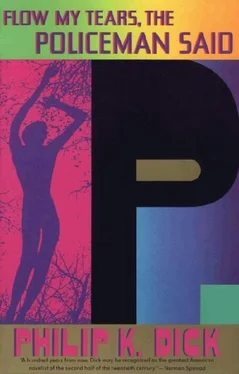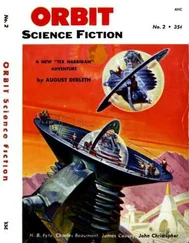“Your red,” Jason said, “is fantidulous.”
“I know.” Alys’s lips turned down. “Can’t you hold your hit, man? I’m trying to tell you something. Felix got demoted , from police marshal to police general, because he saw to it, when he could, that in the kibbutzim the students were bathed, fed, their medical supplies looked after, cots provided. Like he did for the forced-labor camps under his jurisdiction. So now he’s just a general. But they leave him alone. They’ve done all they can to him for now and he still holds a high office.”
“But your incest,” Jason said. “What if?” He paused; he could not remember the rest of his sentence. “If,” he said, and that seemed to be it; he felt a furious glow, arising from the fact that he had managed to convey his message to her. “If,” he said again, and the inner glow became wild with happy fury. He exclaimed aloud.
“You mean what if the marshals knew that Felix and I have a son? What would they do?”
“They would do,” Jason said. “Can we hear some music? Or give me—” His words ceased; none more entered his brain. “Gee,” he said. “My mother wouldn’t be here. Death.”
Alys inhaled deeply, sighed. “Okay, Jason,” she said. “I’ll give up trying to rap with you. Until your head is back.”
“Talk,” he said.
“Would you like to see my bondage cartoons?”
“What,” he said, “that’s?”
“Drawings, very stylized, of chicks tied up, and men—”
“Can I lie down?” he said. “My legs won’t work. I think my right leg extends to the moon. In other words”—he considered—“I broke it standing up.”
“Come here.” She led him, step by step, from the study and back into the living room. “Lie down on the couch,” she told him. With agonizing difficulty he did so. “I’ll go get you some Thorazine; it’ll counteract the mes.”
“This is a mess,” he said.
“Let’s see … where the hell did I put that? I rarely if ever have to use it, but I keep it in case something like this … God damn it, can’t you drop a single cap of mes and be something? I take five at once.”
“But you’re vast,” Jason said.
“I’ll be back; I’m going upstairs.” Alys strode off, toward a door located several distances away; for a long, long time he watched her dwindle—how did she accomplish it? It seemed incredible that she could shrink down to almost nothing—and then she vanished. He felt, at that, terrible fear. He knew that he had become alone, without help. Who will help me? he asked himself. I have to get away from these stamps and cups and snuffboxes and bondage cartoons and phone grids and frog’s legs I’ve got to get to that quibble I’ve got to fly away and back to where I know back in town maybe with Ruth Rae if they’ve let her go or even back to Kathy Nelson this woman is too much for me so is her brother them and their incest child in Florida named what?
He rose unsteadily, groped his way across a rug that sprang a million leaks of pure pigment as he trod on it, crushing it with his ponderous shoes, and then, at last, he stumbled against the front door of the unsteady room.
Sunlight. He had gotten outside.
The quibble.
He hobbled to it.
Inside he sat at the controls, bewildered by legions of knobs, levers, wheels, pedals, dials. “Why doesn’t it go?” he said aloud. “Get going!” he told it, rocking back and forth in the driver’s seat. “Won’t she let me go?” he asked the quibble.
The keys. Of course he couldn’t fly it no keys.
Her coat in the back seat; he had witnessed it. And also her large mailpouch purse. There, the keys in her purse. There.
The two record albums. Taverner and the Blue, Blue Blues . And the best of them all: There’ll be a Good Time . He groped, managed somehow to lift both record albums up, conveyed them to the empty seat beside him. I have the proof here, he realized. It’s here in these records and it’s here in the house. With her. I’ve got to find it here if I’m going to. Find it. Nowhere else. Even General Mr. Felix What-Is-He-Named? he won’t find it. He doesn’t know. As much as me.
Carrying the enormous record albums he ran back to the house—around him the landscape flowed, with whip, tall, tree-like organisms gulping in air out of the sweet blue sky, organisms which absorbed water and light, ate the hue into the sky … he reached the gate, pushed against it. The gate did not budge. Button.
He found no.
Step by step. Feel each inch with fingers. Like in the dark. Yes, he thought. I’m in darkness. He set down the much-too-big record albums, stood against the wall beside the gate, slowly massaged the rubber-like surface of the wall. Nothing. Nothing.
The button.
He pressed it, grabbed up the record albums, stood in front of the gate as it incredibly slowly creaked its noisy protesting way open.
A brown-uniformed man carrying a gun appeared. Jason said, “I had to go back to the quibble for something.”
“Perfectly all right, sir,” the man in the brown uniform said. “I saw you leave and I knew you’d be back.”
“Is she insane?” Jason asked him.
“I’m not in a position to know, sir,” the man in the brown uniform said, and he backed away, touching his visored cap.
The front door of the house hung open as he had left it. He scrambled through, descended brick steps, found himself once more in the radically irregular living room with its million-mile-high ceiling. “Alys!” he said. Was she in the room? He carefully looked in all directions; as he had done when searching for the button he phased his way through every visible inch of the room. The bar at the far end with the handsome walnut drug cabinet … couch, chairs. Pictures on the walls. A face in one of the pictures jeered at him but he did not care; it could not leave the wall. The quad phonograph.
His records. Play them.
He lifted at the lid of the phonograph but it wouldn’t open. Why? he asked. Locked? No, it slid out. He slid it out, with a terrible noise, as if he had destroyed it. Tone arm. Spindle. He got one of his records out of its sleeve and placed in on the spindle. I can work these things, he said, and turned on the amplifiers, setting the mode to phono. Switch that activated the changer. He twisted it. The tone arm lifted; the turntable began to spin, agonizingly slowly. What was the matter with it? Wrong speed? No; he checked. Thirty-three and a third. The mechanism of the spindle heaved and the record dropped.
Loud noise of the needle hitting the lead-in groove. Crackles of dust, clicks. Typical of old quad records. Easily misused and damaged; all you had to do was breathe on them.
Background hiss. More crackles.
No music.
Lifting the tone arm, he set it farther in. Great roaring crash as the stylus struck the surface; he winced, sought the volume control to turn it down. Still no music. No sound of himself singing.
The strength the mescaline had over him began now to waver; he felt coldly, keenly sober. The other record. Swiftly he got it from its jacket and sleeve, placed it on the spindle, rejected the first record.
Sound of the needle touching plastic surface. Background hiss and the inevitable crackles and clicks. Still no music.
The records were blank.
Never may my woes be relieved,
Since pity is fled;
And tears and sighs and groans my weary days
Of all joys have deprived.
“Alys!” Jason Taverner called loudly. No answer. Is it the mescaline? he asked himself. He made his way clumsily from the phonograph toward the door through which Alys had gone. A long hallway, deep-pile wool carpet. At the far end stairs with a black iron railing, leading up to the second floor.
Читать дальше









